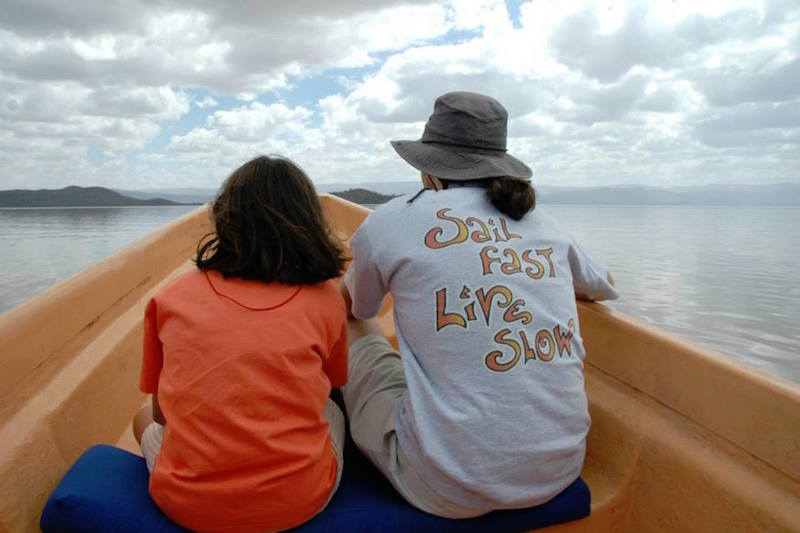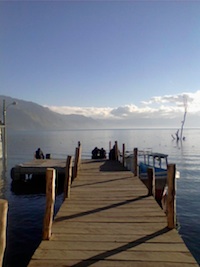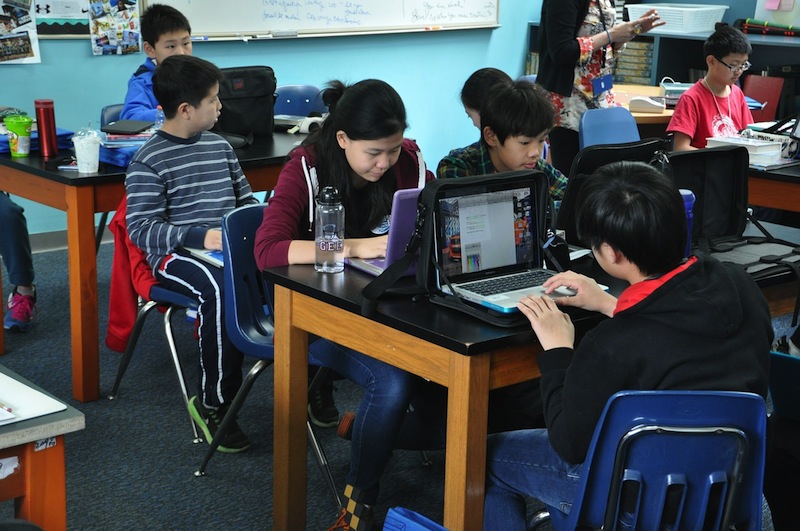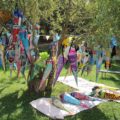
Marinella is a long time friend of Expatclic. She got in touch with us at a very special moment in her life: She had to decide whether to relocate to Guatemala, and hundreds of doubts filled her mind.
On one side the strong impulse to go towards a deeper life, in contact with meaningful human situations; on the other, all the fears linked to relocating her children, changing them of school system, language, and environment. And, in this case, even bringing them to school by boat.
Marinella and I wrote each other often at that time. I was passionate about her case of young mother with the possibility of relocating for work in a country I had visited and near which I had lived for a long time. She was happy to interact with someone that had already exposed her children to a nomadic life, and could support her with concrete experiences.
As long as she could, Marinella was a honorary member of Expatclic, she supported the website financially and sent us wonderful articles. We never lost touch, and some months ago we exchanged e-mails to discuss the school situation of her youngest son. Marinella was looking for a piece of advice in a moment of difficult decisions. For this updating on School Abroad, I asked her to share her experience.
“Before moving to Guatemala, I thought my eldest son Elia, 11 years, would be the one to face higher challenges at school. In fact he perfectly integrated in the Caracol International School, inspired by Waldorf, and after the foreseeable difficulties in learning Spanish, everything is all right. We know that we’ll have to deal with some bad marks in Italian once we go back to the Italian school system, but I tell myself that if he learnt Spanish so well in just a few months, going back to study in Italian should not be a problem after all”.
Giulio, 7 years, had a bit of a harder time. When he arrived in Guatemala, he did not go to school for the first six months. He then joined a local preschool, which was highly inadequate. He was the only fair haired child at school and her teacher took to call him “el gringo” (this is how US citizens in particular, but all foreigners in general are called in Central America), but this was not all: the teacher repeatedly explained to him that should he not wash his ears properly when showering, the devil would come at night and eat his feet, causing poor Giulio lots of nightmares.
Marinella decides he must change school, and sends him to the same one as his brother, the Caracol. It’s May, and Giulio attends the new school until July, when he goes to Italy on holidays. Back to Guatemala in September, they find the US teacher’s evaluation: Giulio is not ready to move to primary school. He can continue at the Caracol only if he stays in preschool.
“I believe that all fears and difficulties of an expatmother crystallize in the choices linked to school, especially because happiness at school is definitely pivotal for the welfare of the whole family abroad. The teacher’s evaluation left me incredulous for several reasons. It did not take at all into account all the changes Giulio had been through until he got to Caracol, and that could possibly weight on his school performance. Besides, Giulio has always shown a big interest in reading, and I honestly did not want to see him at seven still making bread and playing with felt, without even recognizing the letter M. I don’t rule out that such an evaluation could be ok for some children, but certainly not for him”.
What do you do when you find yourself in a country with very few good schools, a child that has already gone through major changes, and a teacher that gives and evaluation you totally disagree with? “When you gasp because you have left the rails and decided to go on a different path, and you find yourself facing challenges that involve your children, you naturally seek support everywhere. Unfortunately I must stress how absent our Ministry of Education is in assisting us on this topic. My Spanish friends who live here go to their Embassy to get books, advice, to have their children doing tests, etc. For Italian families, there is nothing whatsoever”.
Marinella goes then on the Internet and starts talking about her situation, seeking advice and support. She finds both in Teacher Manu, a teacher from Ancona (Italy) that listens to her, reassures her and provides her method free of charge.
Before taking a decision Marinella peruses several possibilities: she gathers information about homeschooling, a method she quickly discharges because she thinks that when it comes to school children should have another educational figure besides parents; she goes back to the Caracol teacher and tries to heartily explain her point of view; she discusses all possible choices with Teacher Manu.
 “Eventually we created a puzzle: Giulio goes three days a week at the Caracol school, where he speaks English and Spanish everyday and relates to an international context (which is good, since he spends his afternoons playing on the street with Guatemalan children only); two days a week a private teacher comes home to teach him math and writing, and we fill the remainder with what Teacher Manu sends us – very playful and fun material, that allows him to approach written and read Italian in a joyful way. All in all, with all the difficulties linked to the situation, we have found a good balance, and the idea of going back to Italy in the future scares me less than before. In the end what counts is to see him happy in the moment”.
“Eventually we created a puzzle: Giulio goes three days a week at the Caracol school, where he speaks English and Spanish everyday and relates to an international context (which is good, since he spends his afternoons playing on the street with Guatemalan children only); two days a week a private teacher comes home to teach him math and writing, and we fill the remainder with what Teacher Manu sends us – very playful and fun material, that allows him to approach written and read Italian in a joyful way. All in all, with all the difficulties linked to the situation, we have found a good balance, and the idea of going back to Italy in the future scares me less than before. In the end what counts is to see him happy in the moment”.
In order to continue this way Marinella does not skimp on her time and personal engagement. In the morning everybody gets up early because to get to San Marco, where the school is, you must take the boat and cross the Atitlan lake. You need twenty minutes to reach the pier on foot, and another twenty by boat. Totally unpractical, especially when children get out of school at different times. “The expatmother is a bit like a Barbamum”, says Marinella making me laugh a lot, “she transforms according to her children’s needs. When I go to fetch Giulio, that leaves school at noon, and I must wait for Elia that goes out at 2:30pm, I install myself in a playground and open my portable office, a laptop with mobile connection, so that I can keep on working while Giulio plays”.
The project where Marinella works is called Alma de Colores, you can find details and ways to support it here. Thank you Marinella for this beautiful interview, and for your important work for the population of Guatemala.





